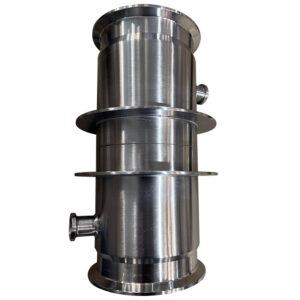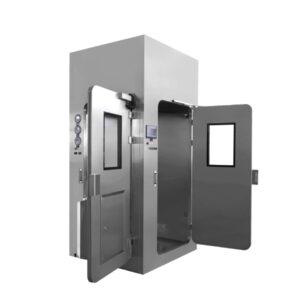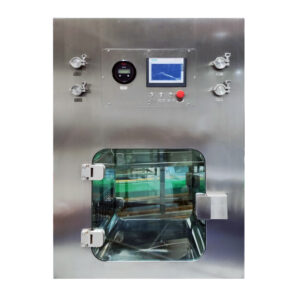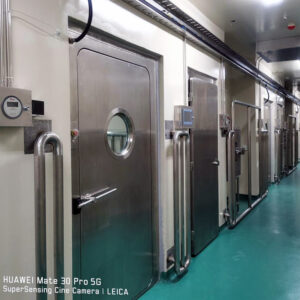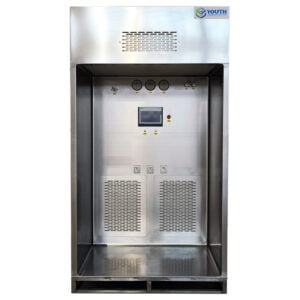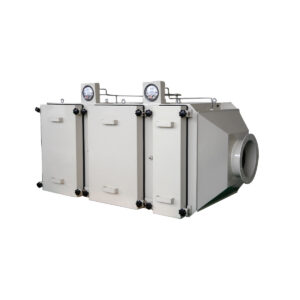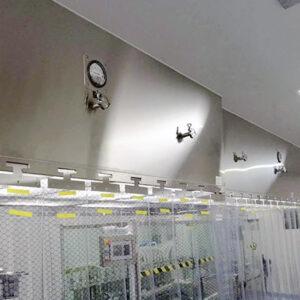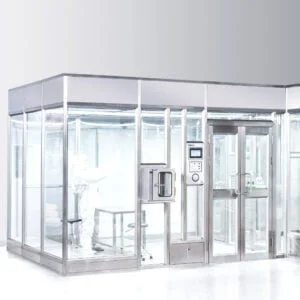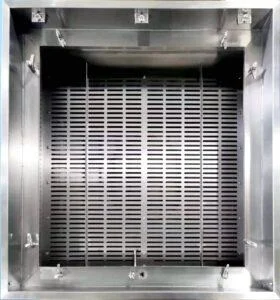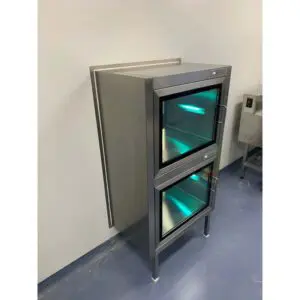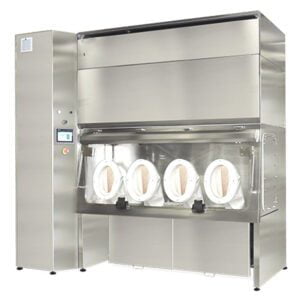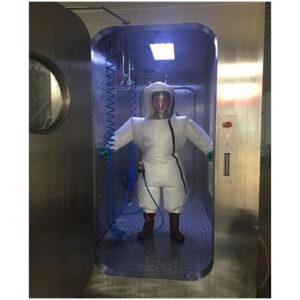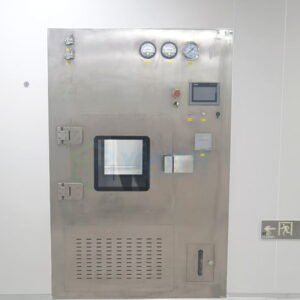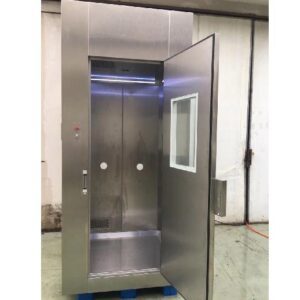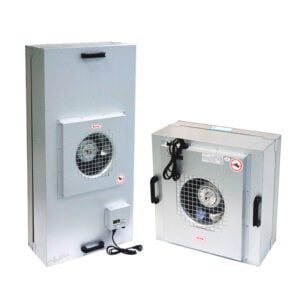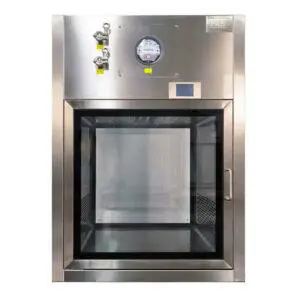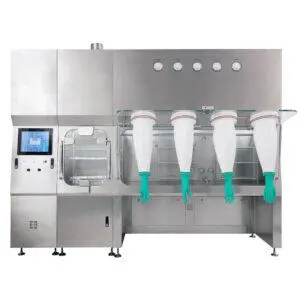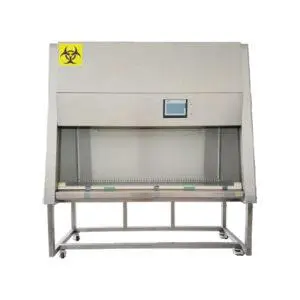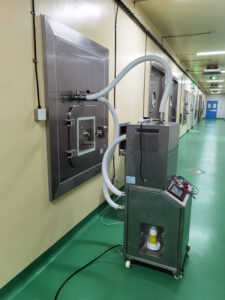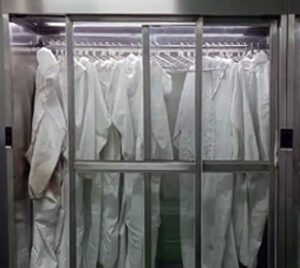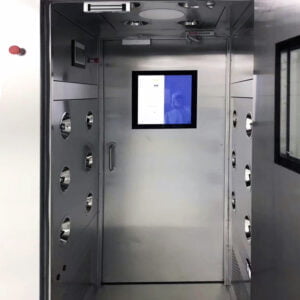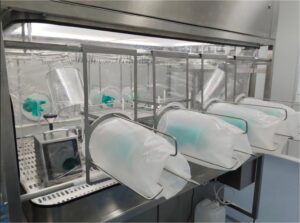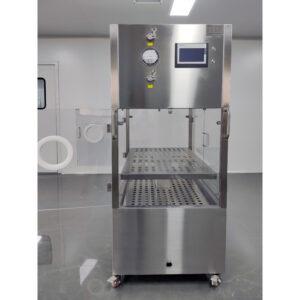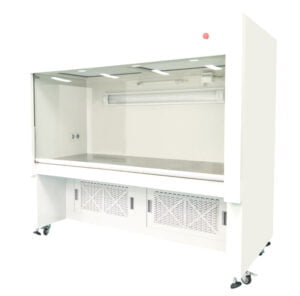The world of clean air technology has seen significant advancements in recent years, with Bag-In-Bag-Out (BIBO) systems emerging as a crucial component in maintaining safe and particle-free environments. These sophisticated filtration systems play a vital role in various industries, from pharmaceutical laboratories to healthcare facilities, where air quality is paramount. As we delve into the efficiency of BIBO systems in particle removal, we'll explore their design, functionality, and the impact they have on creating and maintaining sterile environments.
BIBO systems are engineered to provide a secure method for filter replacement without compromising the cleanliness of the protected space or exposing personnel to potentially hazardous particles. This article will examine the key features that make BIBO systems highly effective, including their high-efficiency particulate air (HEPA) filters, robust construction, and innovative design that ensures contamination-free filter changes. We'll also investigate the various applications of these systems and how they contribute to safety and efficiency in critical environments.
As we transition into the main content, it's important to note that the efficiency of BIBO systems in particle removal is not just a matter of technological advancement, but also a critical factor in maintaining health and safety standards across numerous industries. The ability of these systems to capture and contain even the smallest hazardous particles has made them indispensable in settings where air quality can have life-or-death consequences.
BIBO systems represent a significant leap forward in air filtration technology, offering unparalleled safety and efficiency in particle removal across various critical environments.
| Feature | Benefit | Application |
|---|---|---|
| High-Efficiency HEPA Filters | Captures 99.97% of particles ≥0.3 microns | Cleanrooms, Laboratories |
| Stainless Steel Construction | Durability and easy decontamination | Pharmaceutical Manufacturing |
| Differential Pressure Gauges | Monitors filter performance | Healthcare Facilities |
| Multiple Containment Bags | Ensures safe filter changes | Biosafety Labs |
| Leak Detection Capabilities | Maintains system integrity | Nuclear Facilities |
How do BIBO systems achieve high-efficiency particle removal?
BIBO systems are designed with a primary focus on achieving high-efficiency particle removal while maintaining a safe environment for both the protected space and the personnel operating the system. The core of this efficiency lies in the use of advanced HEPA filters, which are capable of capturing 99.97% of particles that are 0.3 microns or larger in size.
These systems employ a sophisticated filtration process that ensures air passing through the system is thoroughly cleansed of contaminants. The high-efficiency filters are housed within a robust stainless steel enclosure, which not only provides durability but also allows for easy decontamination when necessary.
The efficiency of BIBO systems in particle removal is further enhanced by their ability to maintain a consistent and controlled airflow. This is achieved through the use of differential pressure gauges that monitor filter performance and alert operators when filter changes are required. By ensuring that filters are changed at optimal times, the system maintains peak efficiency throughout its operational life.
BIBO systems utilize cutting-edge HEPA filtration technology and precise airflow control to achieve unprecedented levels of particle removal efficiency, consistently maintaining air quality at the highest standards.
| Filter Type | Efficiency Rating | Particle Size Captured |
|---|---|---|
| HEPA H14 | 99.995% | ≥0.1 microns |
| ULPA | 99.9995% | ≥0.12 microns |
| HEPA H13 | 99.95% | ≥0.3 microns |
What safety features make BIBO systems stand out in contaminant control?
The safety features incorporated into BIBO systems are what truly set them apart in the realm of contaminant control. These systems are designed with a focus on protecting both the environment being filtered and the personnel responsible for maintenance and filter changes. The 'bag-in-bag-out' concept is at the heart of this safety-first approach.
When it comes time to replace a filter, the BIBO system allows for the contaminated filter to be safely removed and a new one installed without any exposure to the potentially hazardous particles trapped within. This is achieved through the use of a continuous polymer bag that creates a secure barrier between the contaminated filter and the external environment.
Additionally, BIBO systems often include biological sealing valves that further prevent the escape of particles during the filter change process. These valves ensure that the system remains sealed at all times, even when filters are being replaced, maintaining the integrity of the clean environment.
The innovative safety features of BIBO systems, including the continuous polymer bagging method and biological sealing valves, provide an unparalleled level of protection against contaminant exposure during filter changes, setting a new standard in air filtration safety.
| Safety Feature | Function | Benefit |
|---|---|---|
| Continuous Polymer Bag | Encapsulates contaminated filter | Prevents particle escape |
| Biological Sealing Valves | Maintains system seal | Ensures containment during changes |
| Leak Detection System | Monitors system integrity | Early warning of potential breaches |
| Stainless Steel Housing | Resists corrosion and contamination | Long-term durability and cleanability |
How versatile are BIBO systems across different industries?
The versatility of BIBO systems is one of their most compelling attributes, making them indispensable across a wide range of industries where air quality and contamination control are critical. From pharmaceutical laboratories to nuclear facilities, BIBO systems have proven their worth in maintaining safe and clean environments.
In the healthcare sector, BIBO systems play a crucial role in protecting patients and staff from airborne pathogens. They are commonly used in isolation rooms, operating theaters, and other areas where maintaining a sterile environment is paramount. The ability to change filters without compromising air quality is particularly valuable in these settings.
The pharmaceutical industry relies heavily on BIBO systems to ensure the purity of their products and the safety of their manufacturing processes. These systems are essential in cleanrooms where even the slightest contamination could have serious consequences. Similarly, in the semiconductor industry, where particle-free environments are crucial for production, BIBO systems are used to maintain the necessary level of cleanliness.
BIBO systems demonstrate remarkable adaptability across various industries, from healthcare to high-tech manufacturing, providing tailored solutions for air quality management and contamination control in diverse and demanding environments.
| Industry | Application | Key Benefit |
|---|---|---|
| Healthcare | Operating Rooms, Isolation Units | Pathogen Control |
| Pharmaceuticals | Cleanrooms, Manufacturing Areas | Product Purity |
| Semiconductors | Fabrication Facilities | Particle-Free Environment |
| Nuclear | Containment Areas | Radioactive Particle Control |
| Biotechnology | Research Laboratories | Biosafety Maintenance |
What role do BIBO systems play in maintaining cleanroom standards?
In the realm of cleanroom technology, BIBO systems play a pivotal role in maintaining the stringent air quality standards required for various critical operations. Cleanrooms are classified based on the number and size of particles permitted per volume of air, and BIBO systems are instrumental in achieving and maintaining these classifications.
The high-efficiency filtration provided by BIBO systems ensures that the air within cleanrooms remains free of contaminants that could compromise sensitive processes or products. This is particularly crucial in industries such as semiconductor manufacturing, where even microscopic particles can cause significant defects in electronic components.
Moreover, the ability to change filters without breaching the cleanroom's integrity is a significant advantage of BIBO systems. This feature allows for routine maintenance without the need for extensive downtime or decontamination procedures, thereby increasing operational efficiency and reducing costs associated with cleanroom management.
BIBO systems are essential in maintaining the integrity of cleanroom environments, providing a reliable and efficient means of air filtration that meets and exceeds industry standards for particle control and contamination prevention.
| Cleanroom Class | Max Particles ≥0.5µm/m³ | BIBO Filter Efficiency |
|---|---|---|
| ISO 5 | 3,520 | 99.995% (H14) |
| ISO 6 | 35,200 | 99.95% (H13) |
| ISO 7 | 352,000 | 99.97% (H12) |
| ISO 8 | 3,520,000 | 99.95% (H11) |
How do BIBO systems contribute to workplace safety in hazardous environments?
Workplace safety is a paramount concern in environments where hazardous materials are present, and BIBO systems play a crucial role in mitigating risks associated with airborne contaminants. These systems are particularly valuable in industries such as nuclear power, chemical processing, and biosafety laboratories, where exposure to dangerous particles can have severe health consequences.
The 'Youth Filter' BIBO systems, available at 'YOUTH Clean Tech', are designed to ensure that workers are protected from exposure during routine maintenance tasks such as filter changes. The bag-in-bag-out method allows for the safe removal and replacement of contaminated filters without releasing hazardous particles into the surrounding environment.
Furthermore, BIBO systems often incorporate additional safety features such as test ports for filter integrity checks and pressure differential indicators that alert operators to potential issues before they become critical. These proactive measures contribute significantly to maintaining a safe working environment and preventing accidental exposures.
BIBO systems are integral to workplace safety protocols in hazardous environments, providing a robust barrier against exposure to dangerous airborne particles and enhancing overall safety measures for personnel working in high-risk areas.
| Safety Feature | Function | Benefit to Workplace Safety |
|---|---|---|
| Bag-In-Bag-Out Method | Containment during filter changes | Minimizes exposure risk |
| Test Ports | Allow for filter integrity checks | Ensures ongoing system efficacy |
| Pressure Indicators | Monitor filter performance | Early warning of potential failures |
| Leak-Tight Seals | Prevent particle escape | Maintain containment integrity |
What advancements in BIBO technology are improving particle removal efficiency?
The field of BIBO technology is continually evolving, with new advancements aimed at improving particle removal efficiency and overall system performance. One of the most significant developments is the integration of smart technology into BIBO systems, allowing for real-time monitoring and adjustment of filtration parameters.
Advanced sensors and IoT connectivity are being incorporated into modern BIBO systems, providing operators with detailed data on air quality, filter performance, and system efficiency. This level of monitoring allows for predictive maintenance, optimizing filter life and ensuring consistent air quality.
Another area of advancement is in filter media technology. Researchers are developing new materials and structures that can capture even smaller particles with greater efficiency. These innovations are pushing the boundaries of what's possible in air filtration, with some systems now capable of removing particles as small as 0.1 microns with near-perfect efficiency.
Recent advancements in BIBO technology, including smart monitoring systems and next-generation filter media, are significantly enhancing particle removal efficiency and system performance, setting new standards in air quality management.
| Technology | Improvement | Impact on Efficiency |
|---|---|---|
| IoT Integration | Real-time monitoring | Optimized performance |
| Advanced Sensors | Precise data collection | Enhanced control |
| Nanofiber Filters | Increased surface area | Higher capture rates |
| AI-driven Systems | Predictive maintenance | Consistent efficiency |
How cost-effective are BIBO systems in long-term particle removal applications?
When evaluating the cost-effectiveness of BIBO systems for long-term particle removal applications, it's essential to consider both the initial investment and the ongoing operational costs. While the upfront cost of a BIBO system may be higher than some alternative filtration methods, the long-term benefits often result in significant cost savings.
The durability and reliability of BIBO systems contribute to their cost-effectiveness. With proper maintenance, these systems can operate efficiently for many years, reducing the need for frequent replacements. Additionally, the ability to change filters without shutting down the entire system or contaminating the protected environment leads to reduced downtime and lower operational costs.
Energy efficiency is another factor that contributes to the cost-effectiveness of BIBO systems. Advanced designs and high-quality filters minimize air resistance, reducing the energy required to maintain proper air flow. This translates to lower energy costs over the life of the system.
While the initial investment in BIBO systems may be higher, their long-term cost-effectiveness is demonstrated through reduced downtime, lower energy consumption, and extended operational lifespans, making them a sound investment for facilities requiring consistent, high-quality air filtration.
| Cost Factor | BIBO System Impact | Long-term Benefit |
|---|---|---|
| Initial Investment | Higher upfront cost | Durability and reliability |
| Operational Costs | Reduced energy consumption | Lower utility expenses |
| Maintenance | Easy filter changes | Minimal downtime |
| Lifespan | Extended system longevity | Delayed replacement costs |
In conclusion, the efficiency of BIBO systems in particle removal is a testament to the advancements in air filtration technology. These systems have proven to be indispensable in maintaining clean and safe environments across a wide range of industries, from healthcare to high-tech manufacturing. The combination of high-efficiency HEPA filters, robust safety features, and innovative design allows BIBO systems to achieve unprecedented levels of air quality while protecting both the environment and personnel.
The versatility of BIBO systems makes them adaptable to various applications, consistently meeting and exceeding industry standards for air quality. Their role in maintaining cleanroom integrity, ensuring workplace safety in hazardous environments, and providing cost-effective long-term solutions for particle removal underscores their importance in modern air quality management.
As technology continues to advance, we can expect to see further improvements in BIBO system efficiency, with smart monitoring, advanced materials, and AI-driven optimization leading the way. These innovations will not only enhance particle removal capabilities but also contribute to more sustainable and energy-efficient operations.
For facilities and industries where air quality is critical, investing in BIBO systems represents a commitment to safety, efficiency, and long-term cost-effectiveness. As we move forward, the continued development and implementation of these systems will play a crucial role in creating and maintaining the clean, safe environments necessary for progress in science, healthcare, and technology.
External Resources
How Bag In Bag Out (BIBO) Systems Ensure Safety in Contaminant Removal – This article from QUALIA explains the key features and benefits of BIBO systems, including their high-efficiency filters, robust stainless steel construction, and differential pressure gauges, highlighting how these systems ensure efficient particle removal and maintain a safe environment.
Bag In Bag Out – BIBO – YOUTH Clean Tech – This resource from YOUTH Clean Tech details the specifications and working principle of BIBO systems, including their high-efficiency filtration capabilities, leak detection features, and the use of multiple containment bags to ensure no hazardous particles escape during filter changes.
Understanding the Bag In Bag Out (BIBO) System – QUALIA – This article provides an in-depth look at the key features, applications, and benefits of BIBO systems. It emphasizes the systems' ability to capture even the smallest hazardous particles, ensuring clean and safe air, and discusses their use in various industries such as pharmaceutical labs and healthcare facilities.
BIBO Bag In Bag Out system and its working principle – This post from Vietnam Cleanroom explains the structure and operating principle of BIBO systems, including the use of high-efficiency HEPA filters (H14), biological sealing valves, and the protective bag method to prevent exposure to hazardous materials during filter replacement.
Bibo Units – Cleanrooms and clean spaces – AFMS – This page from AFMS describes BIBO units as containment systems for safe removal and replacement of HEPA filters in environments at risk of contamination. It highlights the importance of these systems in maintaining clean and safe environments, particularly in laboratories and cleanrooms.
Bag-in-Bag-Out (BIBO) Systems for Safe Filter Replacement – This article from Camfil discusses the safety and efficiency of BIBO systems in replacing contaminated filters without exposing personnel or the environment to hazardous particles. It also covers the various applications of BIBO systems in different industries.
Related Contents:
- Bag-In/Bag-Out (BIBO) Systems: Operation and Maintenance Guide
- Unveiling the Power of Bag-In-Bag-Out Systems
- BIBO Systems: Advancing HEPA Filtration Safety and Efficiency
- The Intricate World of BIBO Filter Housing
- Environmental Impact of BIBO Systems in Industrial Filtration
- Safeguarding Air Quality: The Power of BIBO Systems
- Safeguarding Sterility: BIBO Systems in Cross-Contamination Prevention
- The Cost-Effectiveness of BIBO Systems in Industrial Applications
- Revolutionizing Safety: BIBO Systems in Hazardous Waste Management


